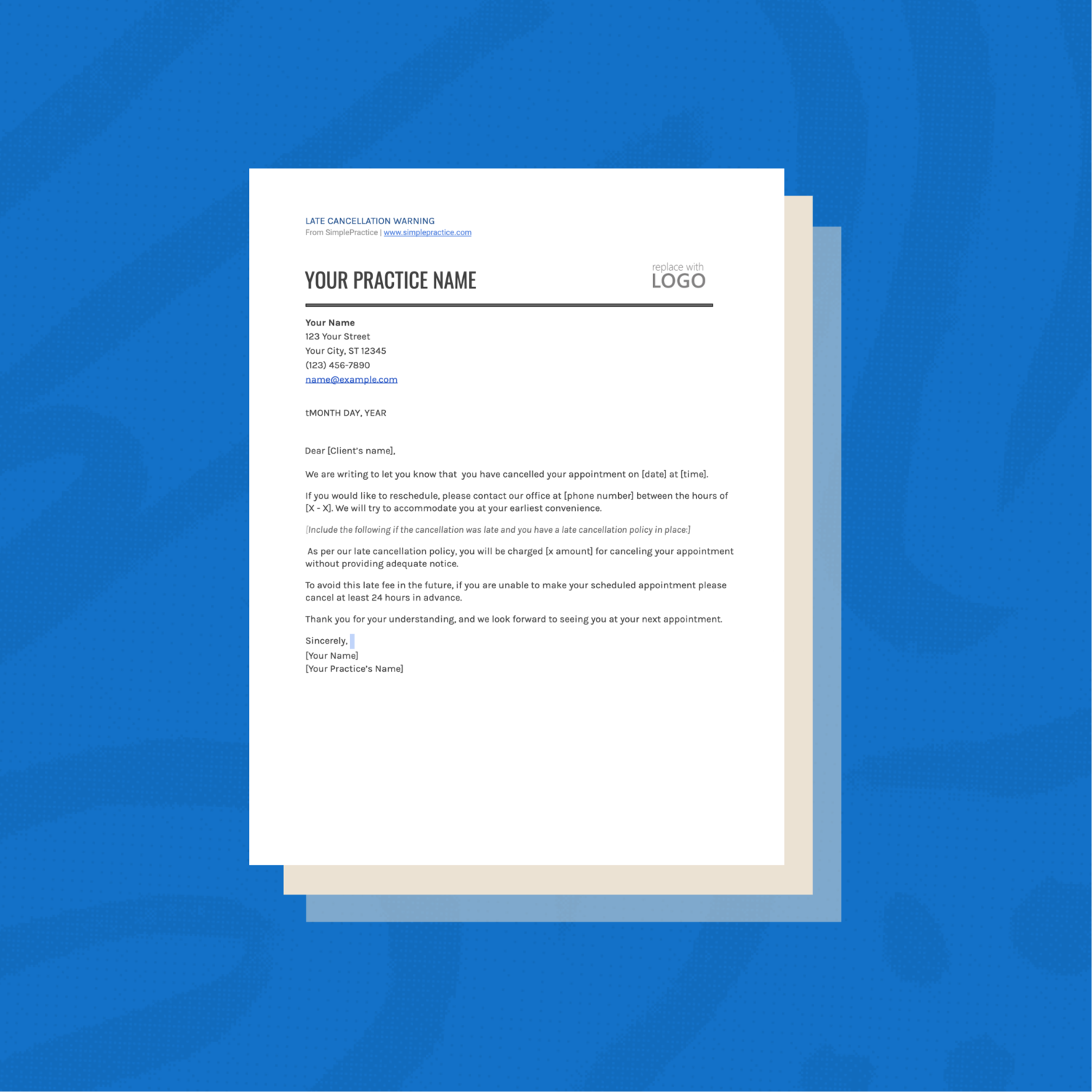Late Cancellation Warning Template
Download the free late cancellation warning template
Download free resource
Enter your email below to access this resource.
By entering your email address, you are opting-in to receive emails from SimplePractice on its various products, solutions, and/or offerings. Unsubscribe anytime.

No-shows and late cancellations pose financial and administrative burdens to therapists. By downloading and customizing our late cancellation warning template, you can clearly and effectively communicate your late cancellation policy to clients—saving yourself time and reducing your risk of income loss in the long-run.
This guide provides an overview of the reasons clinicians need to have a no-show and cancellation policy, and provides appointment cancellation policy examples, as well as a free downloadable late cancellation warning template to customize and save in your electronic health record (EHR).
Why you should have a cancellation policy
It is good practice for mental health therapists to have a late cancellation policy as part of their standard intake paperwork. Here are some of the reasons why:
Missed opportunity to see other clients
If a client doesn’t show up, it isn't just a waste of your time as a provider, it can also be a missed opportunity for other individuals who may want your services. Explaining the terms and consequences of late cancellations with clients upfront can preempt this loss of time, income, and opportunity to provide care.
Ensures fair pay and compensation for your time
Successful private practice therapists need to have a steady flow of clients and income. However, when clients cancel, you could risk losing potential income if you don't have a cancellation policy—meaning you won't get paid fairly for your services.
Clients might not expect to pay for an appointment they didn’t attend and you might not be compensated for your time. Furthermore, if you’re accepting insurance payments, it’s likely the insurance won't pay at all for a missed appointment—and in the case of no-shows and late-cancellations, you probably won't be able to fill the time-slot with another client.
Demonstrates clear boundaries
By setting and enforcing policies regarding no-shows and late cancellations you’re practicing and modeling boundary setting with your clients. You have an expectation that the client will show up to their pre-booked appointment and give adequate notice should they need to cancel. If they don’t adhere to the policy, you enforce the boundary by charging them for their session.
Ensures clients’ commitment to therapy
By enforcing your cancellation policy, you also remind the client of their commitment to their well-being by showing up to their scheduled sessions.
Appointment cancellation policy examples
While some cancellation policies may differ, they generally include standard sections.
For example, here is some of the information you should include in your cancellation policy:
- A specified cancellation window: Specify whether this is 24 or 48 hours.
- Penalties for late cancellations/no-shows: State whether clients will be charged a cancellation fee or the full session rate.
- Exceptions to the policy: Note what you define as an extenuating circumstance, and/or note if you will allow one missed appointment.
- Informed consent: Ensure you obtain the consent of the client enabling you to enforce the policy.
Here are some specific appointment cancellation policy examples:
24-hour appointment cancellation policy example
“If you are unable to make your scheduled appointment, please inform me as soon as possible, via the patient portal. My cancellation policy requires 24 hours’ notice. Cancellations made within 24-hours are subject to the full session fee.”
Penalty/fee example
“Sessions canceled within 24 hours that breach the cancellation policy are subject to the full session fee and your card on file will be charged automatically.”
Policy exception example
“However, if your late cancellation is due to an extenuating circumstance (listed below), please contact me as soon as possible to discuss waiving this fee. Possible exceptions include a family bereavement, medical emergency, contagious illness, or natural disaster.”
It’s best practice for clinicians to remind clients of the cancellation policy in their first session, then include it in reminder emails, texts, or messages. You could also post a copy of it in your practice’s waiting room or include your cancellation policy in your Good Faith Estimate.
Late cancellation warning template
Even with the best intentions, clients may cancel sessions with minimal warning, or simply not show up to their appointment. If the client has already signed your cancellation policy and consented to its terms, you can send them a warning letter about the consequences of their late cancellation or no-show using the cancellation policy template.
Our late cancellation warning template letter provides an easy way to enforce your cancellation policy—whether that be by issuing a warning or charging the cancellation fee. You may also want to include a copy of the policy, or a copy of their signed consent to the policy.
Download our free late cancellation warning template to quickly communicate your cancellation policy to your clients, and the fees they may be responsible for if they violate it.
How SimplePractice streamlines running your practice
SimplePractice is HIPAA-compliant practice management software with everything you need to run your practice built into the platform—from booking and scheduling to insurance and client billing.
If you’ve been considering switching to an EHR system, SimplePractice empowers you to streamline appointment bookings, reminders, and rescheduling and simplify the billing and coding process—so you get more time for the things that matter most to you.
Try SimplePractice free for 30 days. No credit card required.

